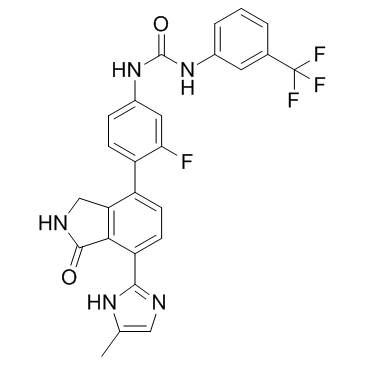| In Vitro |
CG-806 (CG'806) is a small molecule multi-kinase inhibitor against FLT3 and BTK kinases that is under development to treat FLT3-driven AML. CG-806 exerts potent picomolar IC50 anti-proliferative activity against human AML cells and against Ba/F3 mouse AML cells with FLT3-ITD mutations (about 50 to 250-fold higher activity compared to quizartinib or gilteritinib). Specifically, compared to second-generation FLT3 inhibitors quizartinib or gilteritinib, CG-806 shows much more pronounced anti-proliferative effects in leukemia cells with D835 mutations, the ITD plus F691L/Y842D/D835 mutations, or in FLT3 wild-type cells (IC50s are 0.17, 0.82, 9.49, 0.30, 8.26, 9.72, and 0.43 nM for human ITD-mutated AML cells MV4-11, MOLM13, murine ITD mutated leukemia cells Ba/F3 WT, Ba/F3-ITD, Ba/F3-D835Y, Ba/FLT3-ITD+D835Y, and “gatekeeper” mutation Ba/F3-ITD+F691L cells, respectively). Furthermore, CG-8066 triggers profound apoptosis in cell lines. Mechanistically, CG-806 profoundly suppresses FLT3 and its downstream MAPK/AKT signaling, as well as phospho-Aurora, and/or phospho-BTK proteins, suggesting the ability of CG-806 to inhibit various kinases that function in AML signaling and appear to contribute to its effectiveness[1].
|
| In Vivo |
CG-806 demonstrates in vivo tumor eradication without toxicity when administered orally, once daily for 14 d as a single agent in the MV4:11 AML murine xenograft model, and demonstrates sustained micromolar plasma drug levels in mice after a single oral administration. CG-806 can be considered not only a pan-FLT3 inhibitor for targeting FLT3 wild type and ITD-mutant AML, but also a one-of-a-kind agent killing leukemia cells with TKD or dual TKD plus ITD mutations, which are frequently associated with resistance/relapse in FLT3-mutant AML patients. CG-806 exerts a robust therapeutic window in animal xenograft studies. Thus, CG-806 warrants further investigation for the treatment of newly diagnosed and relapsed/refractory patients with FLT3-mutated AML[1].
|
